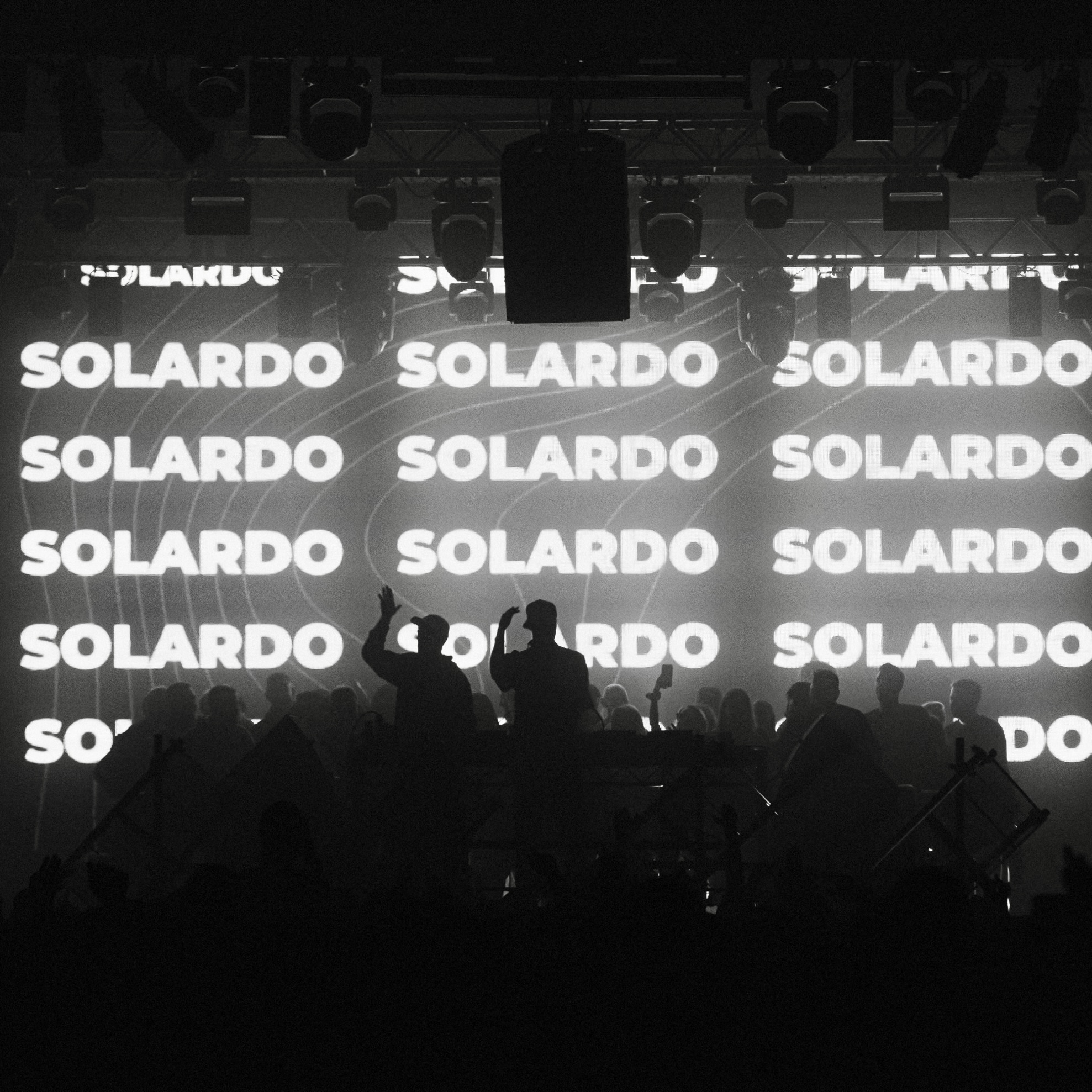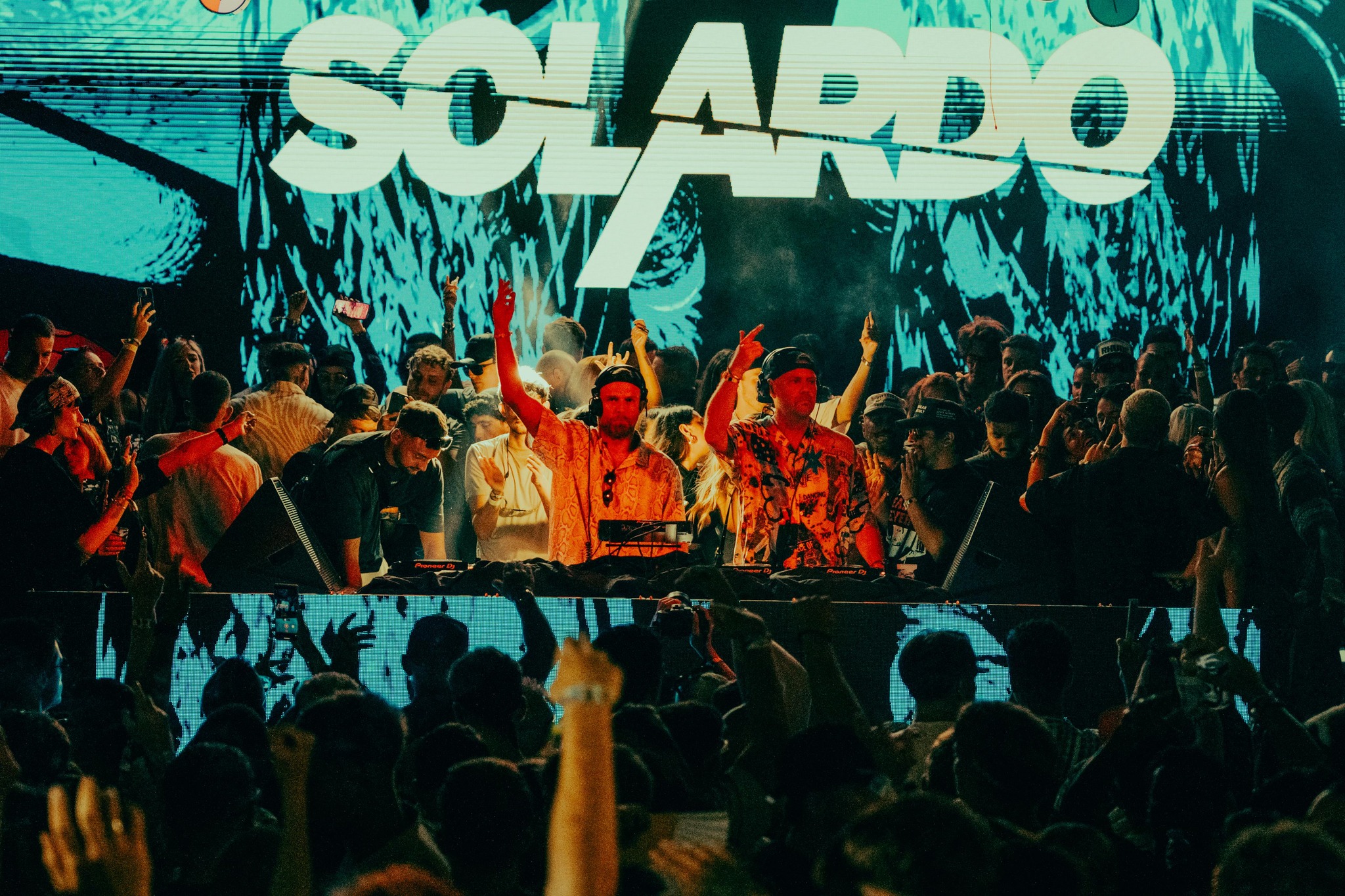
In an industry obsessed with what’s next, Solardo quietly mastered something far rarer: what endures. Over a decade since launching from the warehouse grit of Manchester, the duo—Mark Richards and James Eliot—are still touring the globe, shaping the sound of modern tech-house, with an everlasting fire for sound. Their latest single, a cinematic reimagining of The Police’s “Message in a Bottle” featuring UK trio LOWES, isn’t just a nostalgic nod. It’s a creative pivot that signals how deeply they understand the long game. This isn’t a track engineered for viral loops or algorithm wins—it’s built for sunset sets in Ibiza, for the last track of the night, when the lights fade and emotions linger.
“It’s not just solely for the dancefloor,” James explains, during their EDMNOMAD exclusive interview. “It’s more for a feeling. Like, the end of the night, the last track. We’ve played it many times, and the reaction is always special.” That distinction matters. Because where some artists remix for clout, Solardo reworks with intention. They aren’t just paying tribute to the original—they’re remapping emotional territory. The track is a reminder that dance music, at its best, doesn’t just move your body—it anchors you in a moment you didn’t know you needed.
Fresh Ears in Bangkok: The Obsession With Discovery
When I met Solardo in their Bangkok hotel suite, it was minutes before they were due on stage at Baccarat. Landed from a long-haul flight just hours before their show, instead of resting, they were still wearing headphones—scrolling through emails, playing demos from aspiring producers, and tweaking their USBs like it was soundcheck. For them, the pre-show ritual isn’t about locking in a setlist—it’s about leaving space for something unexpected.
“I think the key to staying very, very fresh is continually discovering music. I’ll have my headphones on till five minutes before we go down,” James said, glancing toward the gear sprawled out across the room. “Just to keep looking, trying to find that wow factor. If people look to you about what’s next, you don’t want to be playing what’s now.” That obsessive curiosity has become a cornerstone of Solardo’s process. Not because it’s trendy—but because it keeps them excited. “A producer from Brazil sent me five tracks,” James continued. “The first two were solid—Beltran’s already playing them. But that fifth one? That was the one. It had a mad vocal, a different take, something I hadn’t heard before.”
It’s not just about being early—it’s about being emotionally present with what’s evolving. They could easily play a set made of 90% unreleased music from their inbox alone. But what makes them different is that they still want to feel surprised, even in the final moments before stepping into a booth. “This is why I’m very focused before the show,” James admitted with a grin. “I want that last-minute energy—that wow moment. That’s what keeps you motivated. It’s what keeps you happy and excited about playing records you actually believe in.”
Whether it’s a demo from a budding artist in Brazil or a rework from a local opener, Solardo are listening. And the crowd feels it—even if they don’t know it yet.
Solardo on Crafting Creativity and Reading the Room
Much of Solardo’s career has been defined by their refusal to settle into a single lane. Their reputation isn’t pinned to a specific BPM or microgenre, but to something harder to manufacture: adaptability. Whether commanding a mainstage slot at Seismic Dance Event or dialing into a more nuanced set in Dubai or Ibiza, their strength lies in reading the room before the room exists.
“We’ve been through ten different scenes,” Mark says. “Old school, jungle, drum and bass, dubstep, bassline, house, electro, and more—we’ve seen it all.” That history isn’t just a badge of honor. It’s a form of survival. While other DJs build brands around predictability, Solardo have built a blueprint rooted in instinct. Before every show, they study the space. Is it a rave or a bottle-service lounge? What’s the vibe of the city? What’s the time slot? “We tailor our sets to that,” James says. “What works at sunrise in Ibiza won’t work peak-time in Texas. You have to be ready for all those moments.”
Their creative process reflects the same logic. New tracks are tested in real time—sometimes just hours after being mixed down. “If I finish a track on Friday, we’ll play it that weekend,” Mark explains. “Then we go back into the studio Monday and tweak it. It’s like tailoring your sound in real time.” That constant refinement can be both gratifying and brutal. “Sometimes a record feels magic in the studio,” James adds, “and then you play it out and it just doesn’t land. That can be really disheartening.” But they don’t shy away from the discomfort. If anything, it keeps them sharp—and keeps the crowd at the center of everything they do.
The Discipline That No One Sees
Behind the energy and genre-hopping agility lies a discipline most fans never witness. In their early years, Solardo partied as hard as they played. Afterparties were non-negotiable. Sleep was a rumor. But with time—and mileage—came a different kind of wisdom. These days, they’ve learned to preserve their energy not for burnout, but for longevity.
“When we first started, we used to party nonstop,” Mark says. “Now, I eat better, I sleep more. I still party sometimes—but it’s more selective.” There’s a practicality in their tone that comes from years of pushing too hard, then pulling back. The late nights didn’t just threaten their productivity; they threatened their clarity—something vital in a career that demands constant decision-making.
Mental health, now a more visible conversation in the dance scene, is something Solardo take seriously. Especially as the bookings intensify—global dates, back-to-back weekends, and 27-hour flights just to play 48 hours in Australia. What once felt exhilarating now demands structure. “Success isn’t just about making it,” James says. “It’s about sustaining it.” And that sustainability extends to how they support others, too—not just themselves.
Mentorship Without Expectation, Legacy Without Ego
For all their achievements—chart-topping singles, global tours, a DJ Mag Top 100 nod—it’s Sola Records, their own label, that quietly tells the story of who they are. What started as a self-releasing outlet has evolved into one of the most respected platforms in house and tech-house. But more than that, it’s become a network—an incubator for talent that the mainstream hadn’t yet figured out.
Solardo championed the early work of now-major players like CamelPhat, Eli Brown, Ben Hemsley, and Mason Collective. Some of those names came into their studio with nothing but talent and nerves. “We’ve done a lot of mentorship,” James says. “Some people just need someone to say, ‘That’s sick. You’ve got something.’ We’ve seen it happen again and again.” Not every story ends with mutual gratitude. Some artists took what they needed and moved on. “We’ve helped people who didn’t appreciate it. That’s part of it,” James adds. “You win some, you lose some.” But that doesn’t change their approach. Sola isn’t about ownership—it’s about opening doors. The label’s success is built not on contracts but on belief.
“It’s not just a record label,” James continues. “It’s a community.” That community stretches across continents, connects in DMs and backstages, and reflects a vision of the music scene that resists clout culture. It’s about making space—not just for Solardo, but for everyone trying to find their sound in a crowded world.

Solardo Stays Grounded While the Scene Shifts
If there’s any disillusionment in Solardo’s voice, it’s not bitterness—it’s realism. They’ve watched the scene shift around them. The rise of social media has changed the rules of who gets booked and why. Now, virality can edge out discographies. Content can matter more than consistency. “You could have someone who’s released 50 solid records, toured the world, and still lose out to someone who’s just really good on camera,” James says. “It’s mad, but it’s where we’re at.”
They don’t oppose phones on the dancefloor, but they question how often they replace connection with performance. “We get it,” Mark admits. “People want to capture moments. But when we were younger, clubs were communities. You’d walk into Havana in Manchester and know 90% of the crowd—not from school, but from the dancefloor.” That shared experience, that unspoken unity—that’s what they miss most. And yet, for all the noise and metrics and marketing, their compass hasn’t changed. There’s no dream collab in the pipeline, no pivot to fashion or film. Just the next track, the next city delivering their music across the globe igniting discovery and emotion.
“If you’d told me in 2013 we’d get this far,” James says, “I would’ve bet my life you were wrong.” Mark doesn’t need to add much. “I just like making tunes,” he says. “That’s probably what I’ll do forever.”
And that’s the point. Solardo aren’t trying to ride the wave—they’re fortifying the shoreline.
Follow their journey here.
